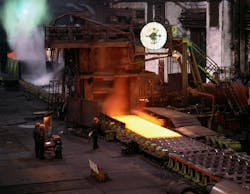Gestamp, Hydnum Select H2, Renewables and Recycling to Manufacture Clean Steel for Automobiles
Automotive components firm Gestamp and metals producer Hydnum Steel are going to collaborate on starting work to accelerate low-carbon steel production using renewable energy and green hydrogen.
The so-called clean steel would be manufactured as automotive components. Gestamp, through its metal recycling subsidiary Gescrap, will supply materials recycled from stamping processes to Hydnum Steel, which will then process it using carbon-free power resources.
Hydrogen is an abundant, light and energy-dense gas but is not naturally mined. It is usually created through steam reforming of methane gas, which is carbon intensive, or by electrolyzers separating the hydrogen atom from water.
Hydrogen does not contain carbon in its chain and does not emit CO2 at the point of use. To be classified as truly green hydrogen, however, it must be generated from electrolyzers powered by carbon-free resources such as solar, wind, hydro or nuclear.
Hydnum Steel is developing what it calls the first “clean steel mill” in the Iberian Peninsula. Among the company’s technological partners include Russula, Siemens and Primetals Technologies.
The agreement also includes technical partnership to develop steel grades meeting the automotive industry’s standards in terms of chemical composition, mechanical properties, thickness, and finish.
Gestamp will have priority access to the low-emission steels for the production of advanced metal components to support the transition to sustainable mobility.
The collaboration will help advance circularity, a crucial factor for decarbonizing the automotive supply chain, and for achieving the Net Zero Car in the future. Gestamp’s circularity model ensures the availability of high-quality scrap to produce ultra-low-emission steels, enabling full traceability of the material lifecycle through collection, sorting, and reintegration into the production chain.
The initiative supports Gestamp’s decarbonization strategy, which focuses on the use of more sustainable raw materials, material recycling, and partnerships with strategic allies for cleaner and efficient mobility. Recycling scrap production, especially steel and aluminum, accounts for more than 70% of Gestamp’s total emissions. More on emissions work on the steel industry.
About the Author
EnergyTech Staff
Rod Walton is head of content for EnergyTech.com. He has spent 17 years covering the energy industry as a newspaper and trade journalist.
Walton formerly was energy writer and business editor at the Tulsa World. Later, he spent six years covering the electricity power sector for Pennwell and Clarion Events. He joined Endeavor and EnergyTech in November 2021.
He can be reached at [email protected].
EnergyTech is focused on the mission critical and large-scale energy users and their sustainability and resiliency goals. These include the commercial and industrial sectors, as well as the military, universities, data centers and microgrids.
Many large-scale energy users such as Fortune 500 companies, and mission-critical users such as military bases, universities, healthcare facilities, public safety and data centers, shifting their energy priorities to reach net-zero carbon goals within the coming decades. These include plans for renewable energy power purchase agreements, but also on-site resiliency projects such as microgrids, combined heat and power, rooftop solar, energy storage, digitalization and building efficiency upgrades.
